LGBT candidates in the midterm elections leading the Rainbow Wave
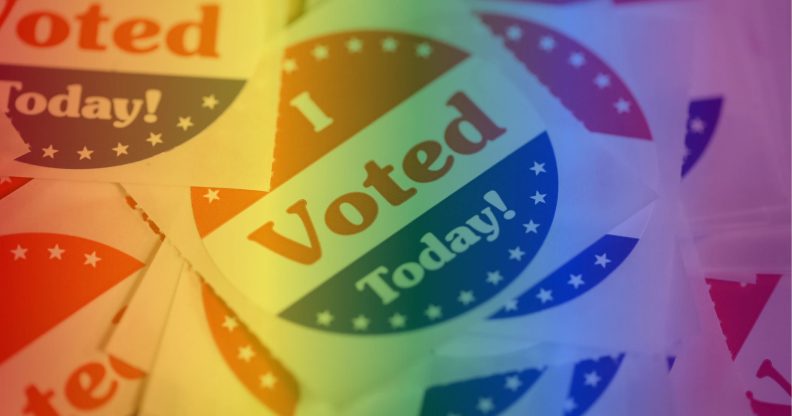
The Democratic Party hopes to paint Congress in blue at the midterm elections—but there is more than one colour in the spectrum of candidates hoping to win political office on November 6.
A so-called ‘Rainbow wave’ of openly LGBT+ candidates is running for major political office in the upcoming elections, which will call voters to the ballots to fill all 435 seats in the House of Representatives, 33 seats in the Senate seats and pick 34 state Governors.
LGBT+ people are severely underrepresented across all levels of politics in the US. The 21 openly LGBT+ candidates running for the House of Representatives, the two in the run for Senate seats, and the four hoping to win their state’s gubernatorial race could be about to break barriers on November 6.
In a sign of the extreme political divide on LGBT+ issues, all 27 of the out LGBT+ candidates are Democrats, with no Republican candidates running for major political office publicly identifying as LGBT+.
University of North Carolina politics professor Andrew Reynolds, an expert on LGBT+ representation in politics, is however cautious in predicting widespread electoral success for the Rainbow Wave, telling PinkNews that “small increases” in LGBT+ representation are the most likely outcome.
For several LGBT+ candidates, their close-fought races continue to hang in the balance ahead of election day. PinkNews took a look at the most closely-watched races.
Tammy Baldwin (Senate, Wisconsin)
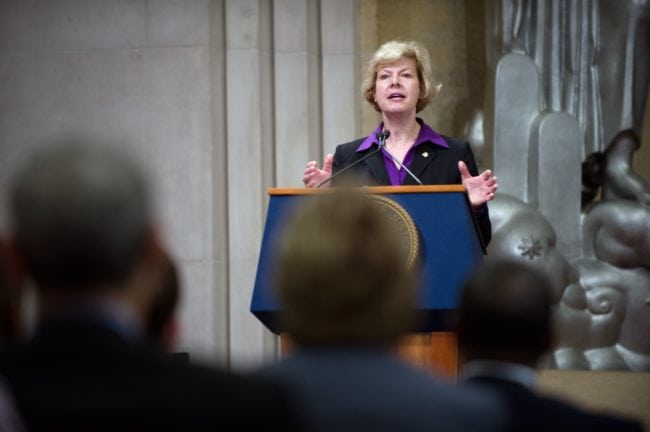
US Democratic Senator from Wisconsin Tammy Baldwin, the first openly gay senator (NICHOLAS KAMM/AFP/Getty)
Wisconsin Democrat Tammy Baldwin was the first-ever out member of the US Senate when she was first elected in 2012.
Baldwin co-chairs the Congressional LGBT Equality Caucus, and has championed LGBT+ rights across her six years in the Senate to date.
The only Democrat who holds statewide office in Wisconsin, Baldwin is facing a challenge from Republican state lawmaker Leah Vukmir, an opponent of LGBT+ rights.
The Human Rights Campaign notes that Vukmir “has repeatedly taken extreme positions far outside the mainstream,” and has derailed efforts to pass common sense protections for LGBT+ people in the state, including protections for LGBT+ youth facing discrimination and bullying at school.
Anti-LGBT activists have been extensively fundraising against Baldwin, with a conservative Political Action Committee (PAC) branding her a “pervert” who wants to “require children starting at age 5 to learn about gay sex.”
Baldwin said: “As more members of the LGBTQ community are elected and become public servants, [our] voices will become louder.
“But for now, we must do everything we can to promote tolerance and fight discrimination. We have work to do until we achieve full acceptance and equality.”
An NBC News/Marist poll on October 3 has Baldwin with 54 percent of the vote, 14 points ahead of Vukmir on 40 percent.
Kyrsten Sinema (Senate, Arizona)
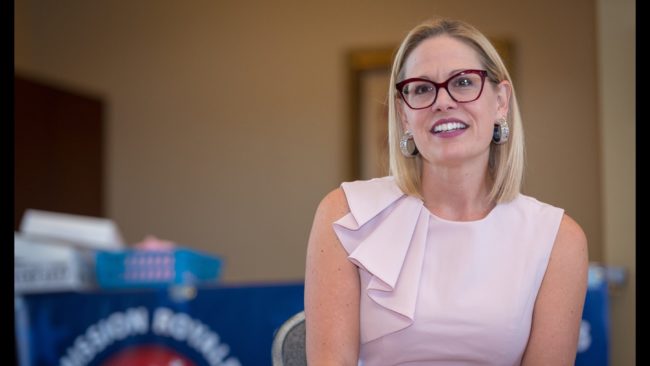
Kyrsten Sinema
The race for the US Senate seat vacated by Senator Jeff Flake is one of the most closely-watched battles ahead of the midterms, as a Democratic victory in the election could upset the chamber’s narrow 51-49 GOP majority.
If elected, Sinema, who currently sits in the US House of Representatives, will become the first openly bisexual member of the US Senate.
Her opponent, Republican Martha McSally, has supported Trump’s ban on transgender troops in the military and backed ‘freedom to discriminate’ laws.
During her time in Congress, Sinema has co-sponsored the Equality Act, which would amend the 1964 Civil Rights Act to also ban discrimination on the basis of sexual orientation and gender identity.
She has also sponsored HR4041, a bill that would enshrine transgender people’s right to serve in the US military.
Annise Parker of LGBTQ Victory Fund, a PAC seeking to support LGBT+ elected officials, said that this race is important ”not just for the Democratic party and for the LGBTQ community, but for all Americans who demand an end to the political divisiveness that Martha McSally embodies.”
She added that the result in the race will be a “defining moment” for the ‘Rainbow Wave,’ and will further “the evolution in how Americans view LGBTQ people and candidates.”
Polling shows the vote on a knife-edge. A CBS News/YouGov poll on October 5 showed Sinema leading McSally by 47 percent to 44, but a New York Times poll on October 19 showed her trailing by 46 percent to 48, firmly within the poll’s margin for error.
Kate Brown (Governor, Oregon)
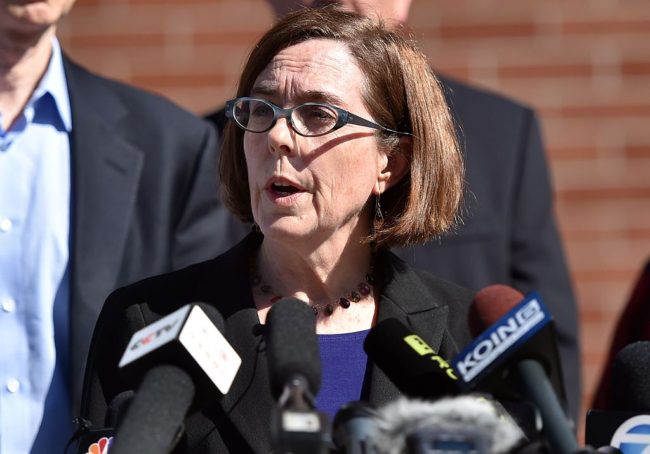
Oregon Governor Kate Brown (Josh Edelson/AFP/Getty Images)
Brown is running for her first full term as governor of Oregon, after assuming the role on an acting basis in 2015 when the previous governor resigned.
The bisexual Democrat already made history as the first out governor of a US state, and is now set to challenge for another four years in the role.
As governor, she signed a transgender equality bill, outlawed gay ‘cure’ therapy, and has been among the state Governors to stand up to the Trump White House’s policies towards refugees.
Victory Fund, which is backing Brown, praised her work to date in advancing legislation that improves the lives of LGBTQ veterans and trans people.
It added: “When she wins in November, Governor Kate Brown will remain a strong leader for equality and inclusion in Oregon, and that is why Victory Fund is thrilled to endorse her for reelection.”
Brown has a lead over lead over Republican Knute Buehler, with an OPB/DHM poll on October 11 showing her with 40 percent to Buehler’s 35.
Christine Hallquist (Governor, Vermont)
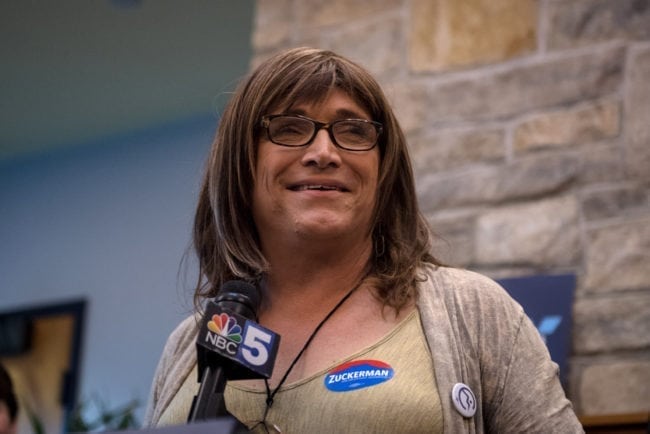
There are currently no transgender politicians in federal or statewide office across any of the 50 states, with the sole example of trans representation in American politics limited to Virginia lawmaker Danica Roem.
But Christine Hallquist, the Democratic candidate for Governor of Vermont, is hoping to change that.
If elected, Hallquist could become the first openly transgender politician in the US. She faces an uphill battle against incumbent Republican Governor Phil Scott, but Vermont has a reputation for picking outsiders—not least one Senator Bernie Sanders, who was first elected as an Independent in 2006 and was re-elected in 2012.
Although she has focused her campaign on local issues, Hallquist has faced transphobic attacks. Her campaign has experienced an influx of abusive messages and death threats.
Speaking to The Hill, she said: “I told the campaign team right in the beginning that if we’re successful and the more successful we get, the more hatred, the more vitriol and more death threats would occur.
“I think it’s a natural outcome of where our country is today. We are a divided country… I land that squarely at the administration in Washington.
“I should tell you, it doesn’t scare me at all (…) We lay our lives on the line for a healthy democracy.”
An October 14 Braun Research poll had Scott on 42 percent of the vote, ahead of Hallquist on 28, with 22 percent still undecided.
Lupe Valdez (Governor, Texas)
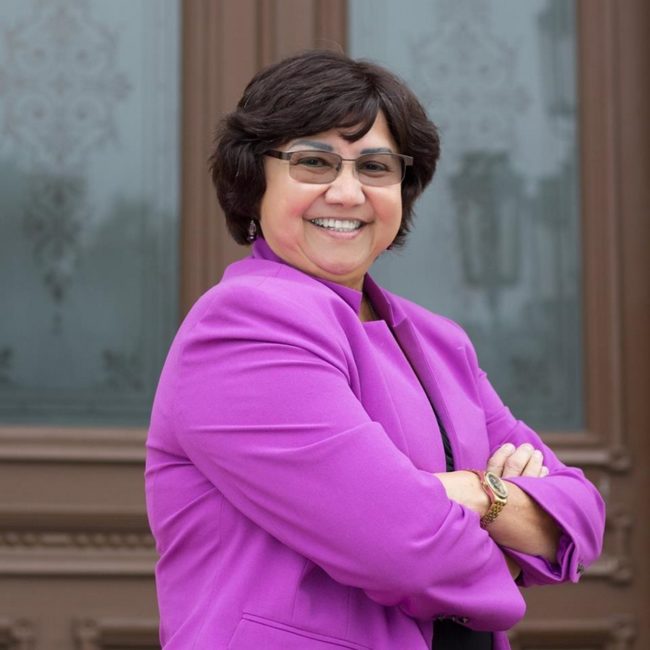
Lupe Valdez
A few years ago, the possibility of a Mexican-American lesbian police sheriff becoming governor of Texas might have seemed like a long shot.
But Democratic candidate Lupe Valdez has picked up momentum in her challenge against anti-LGBT Republican incumbent Greg Abbott, as the red state turns a deep shade of purple thanks to increased support for Democrats.
Her campaign could be buoyed by a surge in support for Beto O’Rourke, the Democratic challenger for the state’s Senate seat against incumbent Ted Cruz, who is up for election on the same day.
O’Rourke has led a fiery challenge against anti-LGBT Senator Cruz, with a surge in popular support bringing a competitiveness not generally seen in Texas races.
If elected, Valdez would become one of the first out LGBT+ official in Texas.
Speaking at a rally, Valdez said: “We’re going to make it happen. A stronger and fair Texas. A tolerant and diverse Texas. A Texas where the everyday person has a voice and a shot just as I did.”
Addressing the odds at the same event, she said: “Please tell me when I didn’t have an uphill battle… I am getting darn good at uphill battles, and I’m not done yet.”
A CNN poll on October 13 shows Valdez trailing Abbott by 18 points, with 39 percent of the vote to his 57 percent.
Jared Polis (Governor, Colorado)
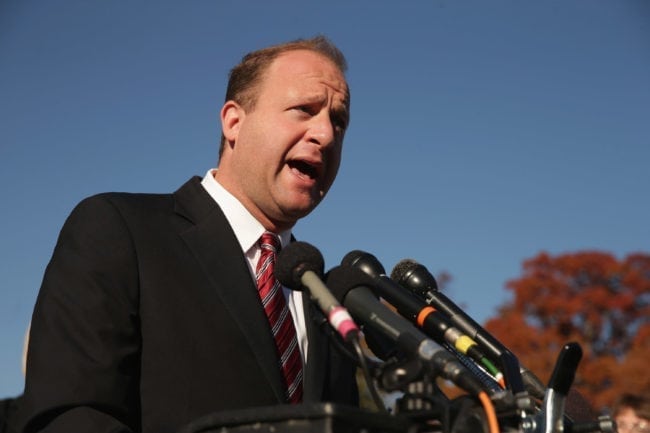
Jared Polis in 2014 (Chip Somodevilla/Getty)
Polis has been one of the leading lights for LGBT+ rights in the House of Representatives, co-chairing the LGBT Equality Caucus and co-sponsoring the Matthew Shepard and James Byrd, Jr. Hate Crimes Prevention Act, which federally recognises anti-LGBT hate crimes.
He is now running to become governor of Colorado, and if successful would be the first openly gay man elected governor in the United States.
In a recent speech to Colorado Democrats, Polis highlighted the impact that being an openly gay person in the state’s highest position could have, particularly under the current President and administration.
Polis said: “I think it really gives Colorado an opportunity to stick a thumb in the eye of Mike Pence, whose view of America is not as inclusive as where America is today.”
He faces Republican candidate Walker Stapleton.
Victory Fund praised the work of Polis in Congress, adding that he is “someone we can all count on to fight and win the tough battles.”
The organisation said: “Whether as an entrepreneur creating hundreds of jobs, a superintendent at a school for vulnerable kids, or a representative fighting on the front lines for LGBTQ equality, Jared’s entire career has been defined by turning bold ideas into real results for Americans from all walks of life.
“We will be proud to stand by him when he becomes the first openly gay person to be elected governor.”
A Magellan poll on October 10 showed Polis on 47 percent, seven points ahead of Stapleton on 40 percent.
Gina Ortiz Jones (House, Texas-23)
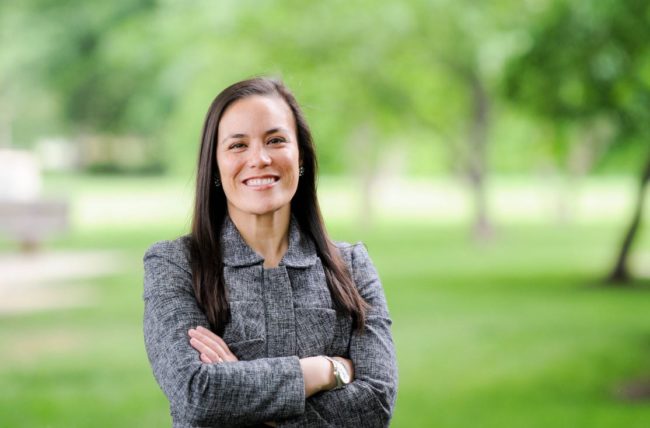
Jones is the Democratic candidate for Texas’s 23rd congressional district in the House of Representatives, challenging incumbent Republican Rep. Will Hurd.
The Air Force veteran could become the first openly gay woman of colour from Texas elected to Congress.
Her opponent’s seat is one of the most vulnerable in Texas in the event of a Democratic surge, with Hurd having retained the seat in 2014 and 2016 by fewer than 3,000 votes—lower than the number of votes attracted by third-party candidates.
Hurd has a poor record on LGBT+ rights, scoring 48 on the Human Rights Campaign’s Congressional scorecard.
Equality PAC Chair Rep. Mark Takano (D-CA) said that Gina Ortiz Jones is “exactly the kind of candidate we need to gain a pro-equality majority in 2018.”
Takano explained: “Gina bravely served our country in uniform under Don’t Ask Don’t Tell, and knows first hand the corrosive effect of anti-LGBT policies.
“Her voice and perspective will be an invaluable addition to not just debates on equality, but military readiness, national security, health care policy, and all the myriad issues members of Congress face every day.”
New York Times polling on October 18 showed Ortiz Jones with 38 percent of the vote, trailing Hurd with 53 percent.
Sharice Davids (House, Kansas-3)
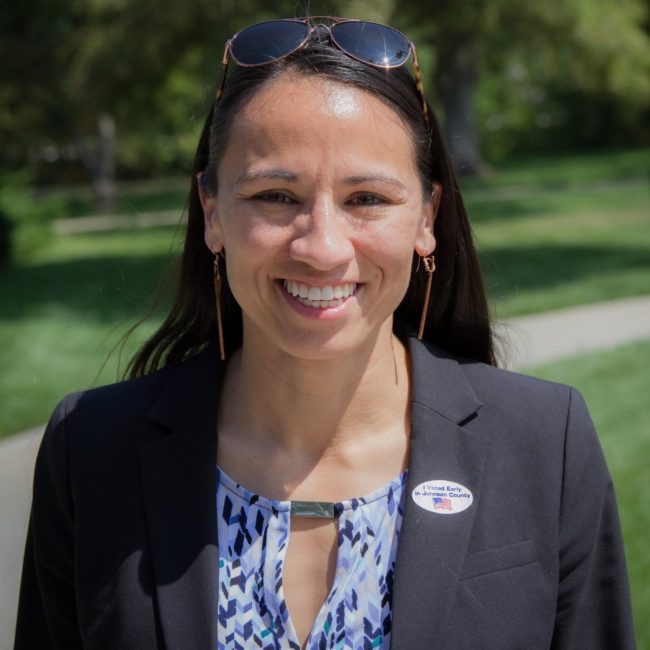
Davids is the Democratic candidate for Kansas’ 3rd congressional district in the House of Representatives, challenging four-term GOP incumbent Kevin Yoder.
If elected, she will be the first out member of Congress from Kansas, and the first female Native American elected to Congress—which is somehow something that hasn’t happened yet.
The political hopeful worked on the Pine Ridge Indian Reservation, before serving as a White House Fellow under President Barack Obama.
Yoder has a zero rating from the Human Rights Campaign for his LGBT+ rights voting record, opposing same-sex marriage.
However, Davids has an uphill battle, given the district’s strong Republican leaning.
Victory Fund’s Parker said: “Sharice’s commitment to smart public policy that addresses the real concerns of constituents makes her the best candidate for Kansas’ 3rd congressional district. When she wins [in] November, Sharice will become a vital LGBTQ voice.”
A New York Times poll on October 17 shows Davids with a health lead in the race. She is on 48 points, ahead of Yoder on 39 percent.
Katie Hill (House, California-25)
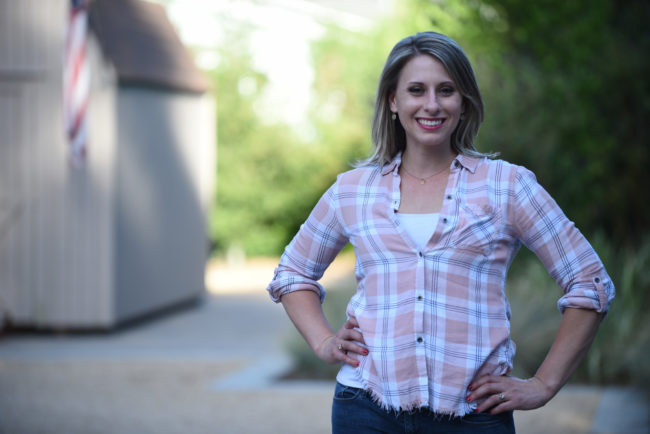
Katie Hill (Katie Hill for Congress)
Homelessness charity boss Katie Hill is the Democratic candidate for California’s 25th congressional district in the House of Representatives.
The candidate, who is bisexual, is challenging anti-LGBT Republican Rep. Steve Knight.
Knight was behind a 2016 plot to pass a law permitting sweeping anti-LGBT discrimination in all federal agencies by attaching it to a defence spending bill.
He was accused of “catering to right wing extremists who would turn back the clock on equality” with the proposal to exempt religious contractors from anti-discrimination rules.
Knight also insists that marriage is “a union of one man and one woman” and opposed California’s ban on gay ‘cure’ therapy.
Annise Parker of Victory Fund said that the race is a key battle between a “positive, solutions-oriented vision” and the “politics of hate and destruction.”
Parker added: “Steve Knight and his family made careers out of attacking LGBTQ people and working to rollback equal rights. Now, voters have an opportunity to defeat him with an openly bisexual woman who has pledged to represent all her constituents.”
The Republican narrowly won the seat in 2014 and 2016, and polling shows the race is on a knife-edge between the two.
An October 4 UC Berkeley poll has Hill on 50 percent, ahead of Knight on 46 percent, but a New York Times/Siena poll on September 19 showed Knight with a two-point lead, on 47 percent to Hill’s 45.

